With the new generation C46, the German manufacturer is trying to offer the best in terms of both comfort and sportiness. I went to Varna, Bulgaria to test the best-equipped C46 model on the Black Sea.
When we talk about compromise, we almost inevitably think of the relationship between the interior space and the optimal hydrodynamic shape of the ship, which, of course, ideally should offer a surface area as small as possible when in contact with water.

It has been considered that yachts with bulky bow sections are more prone to large shocks on a rough sea, due to the larger surface area of contact with the water. But this is not the case, because the sunken section of the hull and the area that actually comes into contact with the water is different when the boat is inclined and thus no longer hits the waves with that flat bottom.
Bavaria C46, design thought out down to the smallest detail
In addition, traditional bow models pass through waves more easily when the hull is in an upright position, but they hit worse when the boat is tilted, because the surface that comes into contact with the water, after the boat plunges over the crest of a wave, is this time almost flat.
Comfort and sportiness
We made this clarification to give you the key in which we analyzed the behavior of the model tested by us in Varna through the kind permission of Bavaria Yachts Romania, in an event held in collaboration with the Bulgarian partner of the Bavarian brand.
However, it should be noted that the C46 model we had at our disposal is unique, being – according to the importer’s statement – the most fully equipped C46 model sold in the current generation. This means, of course, a significant increase in price, a higher weight and a different distribution of masses on the curbs.
SeaTrial: Bavaria C50 tested on the Black Sea
The weather was, so to speak, Mediterranean, with a light breeze that did not exceed 12 knots, the sea almost smooth, without a wave and a summer temperature. I was able to ride on all winds without feeling the slightest discomfort. Perhaps on the starboard tack, an easterly wind caused a swept wave that sometimes generated small jumps, but the movement was smooth, and the boat did not lose speed.

The “V” bow, an already traditional feature of Bavaria Yachts, helps to achieve greater interior space in the front, which maximizes both space for the owner’s cabin and the stability of the boat on the waves. The maximum width, from the area of the ship’s master torque, is “transported” almost entirely to the stern, on the hull being very clearly observed those massive ribs (chines in English), well defined and which have the role of releasing water more efficiently. It is a hull construction that provides very good stability and maneuverability during sailing.
The single-rudder solution is also of great help in terms of handling. The rudder’s single-wedge system provides the helmsman with more direct handling, a more prompt response and more balance when the boat is banded. In fact, this was a solution adopted more to user pressure – because ideally, when the boat is closed, the two-rudder variant is better – because they considered that a better and faster response was also needed when maneuvering with the engine in small spaces, such as marinas.
Handling systems designed for ease of navigation
And speaking of the rudder, I must also mention the architecture of the two rudder pedestals – true works of art, which include large touch screens and separate instrument displays. They are tilted in such a way that they provide optimal visibility even when the helmsman is seated. Also, the handling of the car is simple and very easy with the help of the stick on the starboard console.
Sailing on a calm sea with the mainsail and fire completely open, on a wind of 8-10 knots, at a real wind angle of 45° we recorded an average boat speed of over 6 knots.
Bavaria C46 with Ocean Package
While many of the modern yaches sail surprisingly well and in very light winds, we now found that we needed 10 knots of true wind speed for the Bavaria C46 to come to life, at which point the boat’s movement also became more stable.
The boat tested had a mainsail and a fire, both with furling system and both made by Elvstrom from 95% recycled polyester with 5% Dyneema recipe that increases resistance to stretch and deformation.

As a novelty in the construction of the raft we noticed the vertical whales that better support the leech and stiffen the sail better compared to similar systems without whales. This undoubtedly contributed to the good handling characteristics.
For the handling of the mainsail, a system with two ribs and controlled by large winches positioned close to the rudders was chosen. It is an effective solution that allows the sail to be adjusted efficiently, safer and does not interfere with those who prefer to relax in the cockpit.
European Boat of The Year 2024 or the “Oscar” of the sailing world – nominations
In fact, all the lines on the Bavaria C46 are led to the rudder pedestals through covered channels. It’s easy to reach the winches even if you’re sitting at the helm, while there’s also room for one person on board and another in the cockpit, in front of the pedestals. There are also special baskets for storing the lines at the stern of the winches.
Much more spacious cabins and saloon
Bavaria has given up on incorporating a tender garage on the Bavaria C46, on the grounds that they inevitably represent a big compromise on a boat of this size, resulting in the use of an undersized tender and smaller stern cabins.

Instead, it offers telescopic arms for lifting and mooring the tender, while the storage space on the deck includes two very useful caissons under the cockpit benches, plus a large lazaretto with access between the helm stations and the possibility of equipping the stern bench with a barbeque system – the accessible one on the bathroom platform and refrigerator.
There is also a large sail locker at the front, next to the anchor caisson, although this is not spacious enough for an optional captain’s cabin.
A spacious and modular cockpit
There are two options for the cockpit table, either a large central one or two double tables, folding tables that almost meet in the middle, but which, unfortunately, leave a small free space. This is the solution on our test boat.
When you go down to the lounge, you are struck by the generous volume of accommodation offered by the Bavaria C46. This is visible not only in the wide open spaces of the saloon but also in the impressively large bow owner’s cabin.
The galley is located immediately in front of the navigation station and has a huge amount of countertop space and storage space, plus options for refrigeration, including a large unit with two drawers and a separate top-loading refrigerator. The boat in the test was also equipped with an optional compact dishwasher and a fume hood.

The boat in the test has a configuration with three cabins, two toilets, plus a large storage room, making it ideal for owners. In this version, all beds are of the European king size type, with a width of 160 cm along their entire length. Two different four-cabin configurations are also offered, including a classic four-cabin/four-cabin charter arrangement with two double cabins at the front. The second option is a four-cab/two-toilet owner’s version, which retains the attractive main cab at the front, but adds a small Pullman cab with bunk beds in front of the starboard cab.
The Bavaria C46 owner’s cabin is a lovely open space with a separate toilet and shower cubicle. On the other hand, there is not much storage space here. The cabins at the stern are of equal size, although the boat tested, the one on the port side is configured as a permanent double cabin, while on the starboard side it is configured as two single beds that easily transform into a double bed.
Generous storage spaces will appeal to many private homeowners and have the potential to provide plenty of well-organised and easily accessible storage areas, as well as space for a washer and dryer.
Under the cockpit floor there is easy access to the steering and quadrant system. The 244 l diesel tank can limit the range for those who want to venture further, but there are options for a generous amount of up to 800 l of fresh water.

The construction is made of conventional polyester and fiberglass, with a PVC foam core above the waterline, reinforced by means of sart plates and bulkheads at the bow and stern. The inner matrix is also handmade from E-glass fiber and polyester, with the keel area additionally laminated next to the hull.
As a conclusion
Overall, I was pleasantly surprised by the C46 – it sails better than expected, especially once the wind reaches 10 knots and the sail handling systems are well thought out.
Life on board is beautiful thanks to the large, airy spaces and generous lighting. Selling points for private owners include the owner’s cabin and the shed that will help keep a multitude of equipment in good organization.
The C46 is definitely better than most similar models designed a few decades ago and has a lot more accommodation space both above and below deck. It is also the result of current trends when owners prefer an elegant and comfortable cruiser rather than a massive sailboat for crossing the oceans.
Datasheet Bavaria C46
LOA: 14.5m
Body length: 13.95m
Width: 4.70m
Draught: 2.3m or 1.75m
Displacement (2.3m at keel): 12,730kg
Ballast (standard keel): 2,575kg
Ballast (small keel): 2,858kg
Sail area: 123.8m2
Fuel: 244l
Water: 544l
Design: Cossutti Yacht Design
Base price: €315,600 excl. VAT



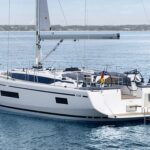

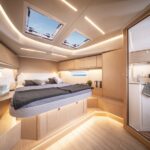
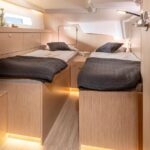
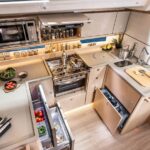
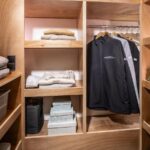


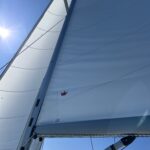
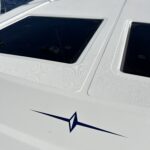
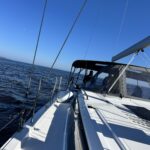
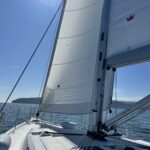

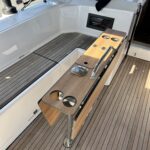
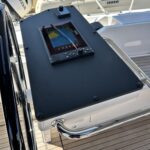
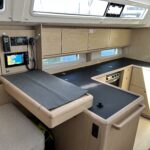
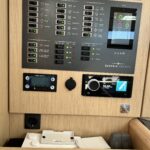
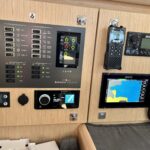
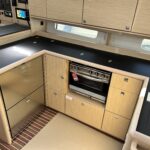
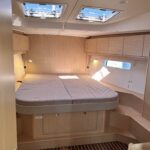
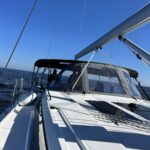
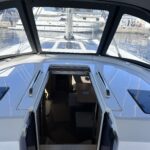
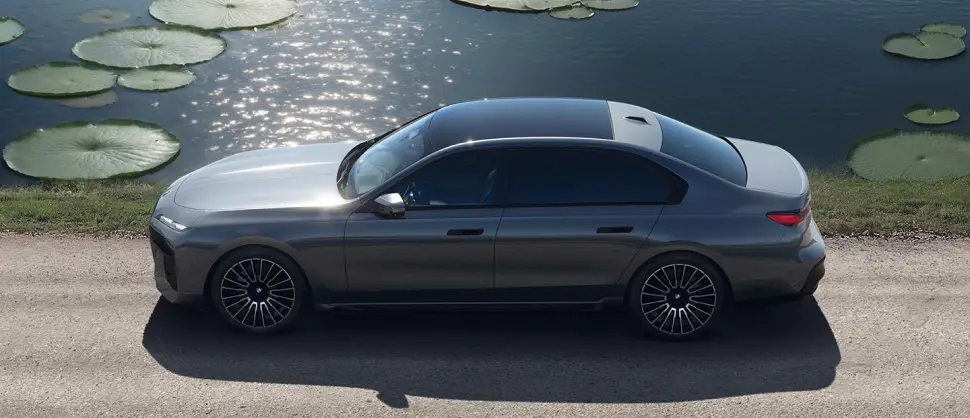

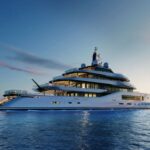





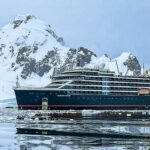


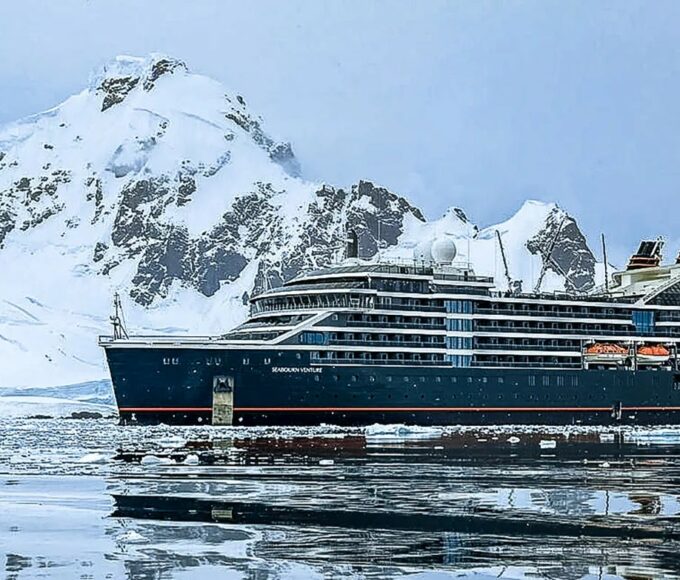
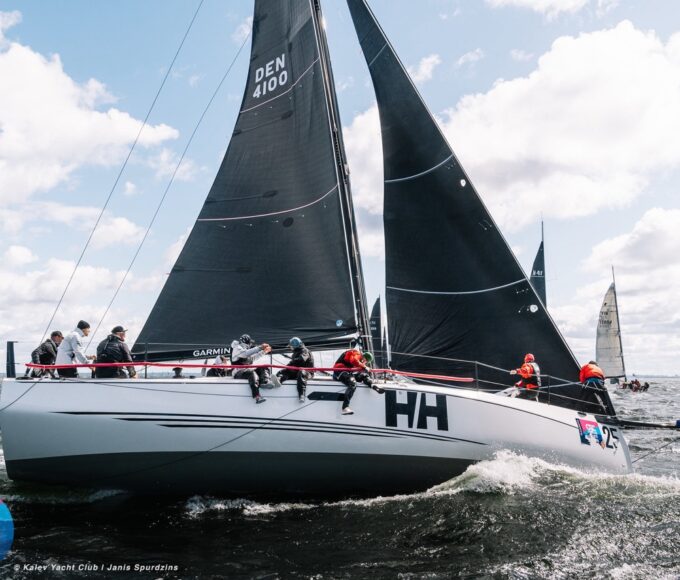
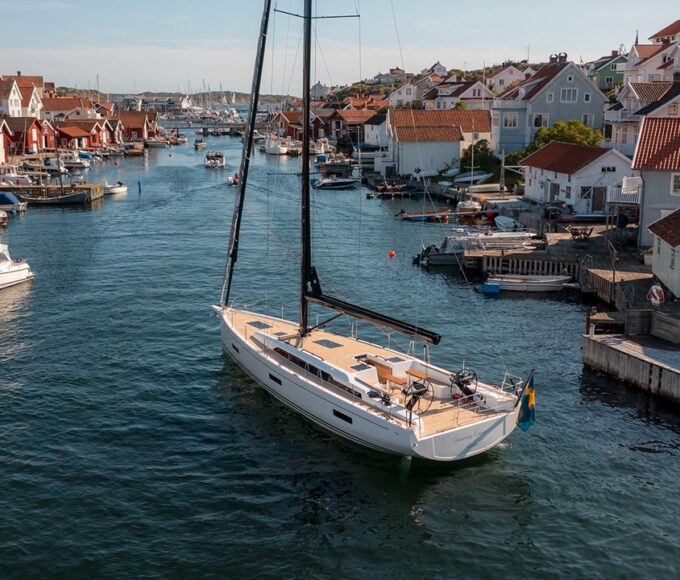
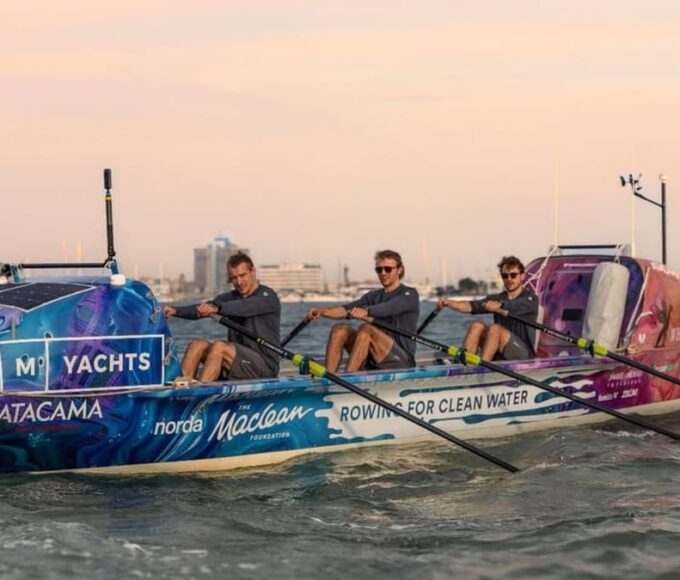
Comentați?